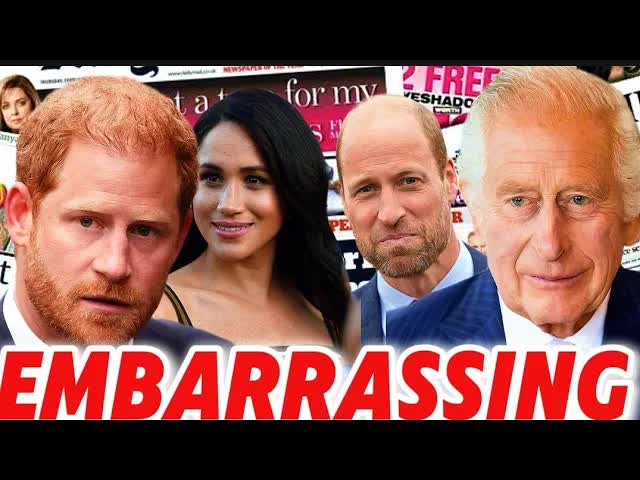The British media’s treatment of Prince Harry and Meghan Markle has reached a fever pitch, characterized by a relentless stream of negative coverage that many would deem toxic.
Ever since their relationship became public, this couple has faced a barrage of scrutiny that seems almost personal.
What’s behind this obsession?
It’s not just about public interest; it reveals deeper issues within the British press, rooted in elitism, racism, and misogyny.
This toxic cocktail has fostered an environment where anyone who challenges the status quo, particularly a woman of color entering the royal family, becomes a target.
The consequences of this onslaught are significant, affecting not only Harry and Meghan’s mental health but also contributing to a broader climate of hostility and division in British society.
It raises an important question: when will the media take responsibility for its role in perpetuating this harmful narrative?
The glaring double standards in how the media treats different members of the royal family are impossible to ignore.
While Harry and Meghan are scrutinized at every turn, other royals, like Prince William and Kate Middleton, seem to glide through life with much greater privacy and protection from the press.
This disparity is especially evident when examining the media’s reaction to privacy concerns; Harry and Meghan are often labeled as out of touch, while their counterparts enjoy a shield from similar criticism.
Moreover, the media’s fixation on Meghan’s actions—be it her fashion choices or parenting decisions—stands in stark contrast to the leniency shown towards Kate Middleton.
When Kate was photographed sunbathing topless, the media largely ignored it, whereas Meghan faced backlash simply for cradling her baby bump.
Such inconsistencies highlight the biases that permeate media reporting, revealing a troubling foundation of elitism and prejudice.
It’s essential to recognize that this obsession with Harry and Meghan isn’t merely a byproduct of public curiosity; it’s a lucrative business model.
The more scandalous the story, the more clicks it attracts, thus generating profits for media outlets.
This race for sensationalism has created an environment where truth takes a backseat to profit, leading to the publication of unverified rumors and outright falsehoods that have severely impacted Harry and Meghan’s lives.
The relentless scrutiny and invasive paparazzi culture have not only taken a toll on their mental well-being but also made it nearly impossible for them to lead ordinary lives.
The rise of social media and the 24/7 news cycle has only intensified this appetite for celebrity gossip, pushing the boundaries of responsible journalism further away.
The media needs to hit pause and reflect on the consequences of its actions.
The parallels between the current media treatment of Harry and Meghan and the tragic death of Princess Diana cannot be overlooked.
Diana was relentlessly pursued by the press, and her death was a direct result of this reckless behavior.
After her passing, many in the media vowed to change, yet it appears those lessons have been forgotten.
The same tabloid culture that pursued Diana is now targeting her son and his wife, showing a shocking lack of growth or accountability.
Harry has voiced his concerns about the similarities between the media’s treatment of his mother and his wife, warning that Meghan could suffer a similar fate if the press doesn’t change its ways.
This situation serves as a stark reminder of the darker side of celebrity culture, where the pursuit of fame can come with dire consequences.
What’s even more disheartening is the silence from other members of the royal family.
While Harry and Meghan face an onslaught of negative press, figures like William and Kate have largely remained quiet.
This silence not only reflects the power dynamics within the royal family but also tacitly endorses the media’s toxic behavior.
It sends a message that racism, misogyny, and bullying are acceptable within the institution.
The impact of this relentless media campaign extends beyond Harry and Meghan; it has wider societal implications.
It normalizes harmful behaviors and creates an environment of fear and intimidation, which is hardly the kind of society anyone would want to inhabit.
The British media must be held accountable for its actions and prioritize responsible reporting over profit.
The treatment of Meghan, in particular, highlights the intersection of race and media representation.
As a woman of color, her presence in the royal family was a beacon of hope for many, symbolizing progress and inclusivity.
Yet, the media’s relentless attacks against her serve as a stark reminder that racism and xenophobia still permeate British society.
In a world where representation matters, the portrayal of individuals like Meghan can either inspire or deter.
When people see themselves in powerful roles, it fosters a sense of belonging.
Conversely, the constant barrage of negativity sends a message that they are unwelcome and unworthy.
It’s time for the media to reassess its approach, embrace accountability, and contribute positively to society rather than perpetuating division and hate.
